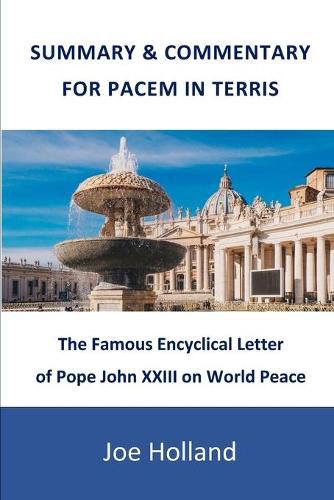Readings Newsletter
Become a Readings Member to make your shopping experience even easier.
Sign in or sign up for free!
You’re not far away from qualifying for FREE standard shipping within Australia
You’ve qualified for FREE standard shipping within Australia
The cart is loading…






Pope John XXIII (1958-1963), subsequently declared a Catholic saint, inaugurated a new global stage of Catholic Social Teaching. His two great social encyclical letters, MATER ET MAGISTRA (1961) and PACEM IN TERRIS (21963) are foundational documents for this new global stage. This book provides a summary and commentary for John’s famous document, which is still periodically celebrated at the United Nations. The summary provides a clear and detailed overview of John’s embrace of the modern human-rights tradition as the foundation for world peace. The commentary provides historical and philosophical context. But John deepened the modern human-rights tradition beyond what he saw as its erroneous philosophical foundation in modern ideologies. Instead, he re-rooted it in the older, deeper, and richer philosophical foundation of Natural Law. Early Christianity had appropriated the philosophical tradition of Natural Law from the Roman Stoics, who in turn had developed it from the Greek Socratic tradition, and especially from Aristotle. John’s encyclical begins by praising the natural order of the universe and the natural order in human beings, all of which he describes as rooted in the Divine order. It then outlines his theory of human rights first in the relationship between human beings and individual political communities, second in the relationship among political communities themselves, and third in relationship of political communities to the world community. In this encyclical, John made three remarkable innovations for Catholic Social Teaching. First, he called for an end to the arms race and for radical disarmament. Second, he eliminated the former ban against Catholic dialogue and cooperation with socialists and communists by distinguishing between error itself and actual persons in error. Third, recognizing the emergence of a new world economy, he called for a democratic global political authority capable of ordering the world economy for the common good - in truth, justice, love, and liberty. The book portrays John in his teaching as a foundational Catholic prophet for the new global stage of Catholic Christianity, and correlatively as a foundational human prophet for the new global stage of the human journey.
$9.00 standard shipping within Australia
FREE standard shipping within Australia for orders over $100.00
Express & International shipping calculated at checkout
Pope John XXIII (1958-1963), subsequently declared a Catholic saint, inaugurated a new global stage of Catholic Social Teaching. His two great social encyclical letters, MATER ET MAGISTRA (1961) and PACEM IN TERRIS (21963) are foundational documents for this new global stage. This book provides a summary and commentary for John’s famous document, which is still periodically celebrated at the United Nations. The summary provides a clear and detailed overview of John’s embrace of the modern human-rights tradition as the foundation for world peace. The commentary provides historical and philosophical context. But John deepened the modern human-rights tradition beyond what he saw as its erroneous philosophical foundation in modern ideologies. Instead, he re-rooted it in the older, deeper, and richer philosophical foundation of Natural Law. Early Christianity had appropriated the philosophical tradition of Natural Law from the Roman Stoics, who in turn had developed it from the Greek Socratic tradition, and especially from Aristotle. John’s encyclical begins by praising the natural order of the universe and the natural order in human beings, all of which he describes as rooted in the Divine order. It then outlines his theory of human rights first in the relationship between human beings and individual political communities, second in the relationship among political communities themselves, and third in relationship of political communities to the world community. In this encyclical, John made three remarkable innovations for Catholic Social Teaching. First, he called for an end to the arms race and for radical disarmament. Second, he eliminated the former ban against Catholic dialogue and cooperation with socialists and communists by distinguishing between error itself and actual persons in error. Third, recognizing the emergence of a new world economy, he called for a democratic global political authority capable of ordering the world economy for the common good - in truth, justice, love, and liberty. The book portrays John in his teaching as a foundational Catholic prophet for the new global stage of Catholic Christianity, and correlatively as a foundational human prophet for the new global stage of the human journey.